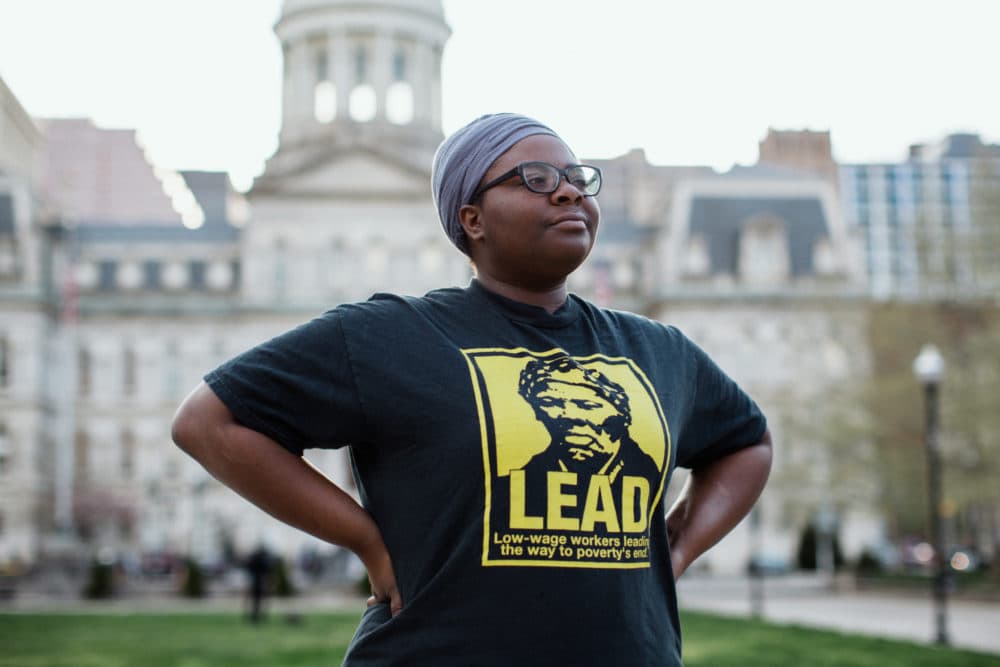Advertisement
Going To Waste
'People's Lives Are Being Put At Risk': Environmentalists Take On Baltimore's Trash Incinerator

Activists in Baltimore have successfully made their case to the City Council that a large trash incinerator is polluting the air and making residents in low-income neighborhoods sick.
In February, lawmakers passed a law putting strict pollution limits on the two incinerators that operate in the city, including the plant that burns most of Baltimore's garbage and converts it to electricity. That plant is managed by the New Hampshire-based company Wheelabrator, which is defending its safety record.
But activists like Destiny Watford aren't convinced that pollution limits are enough.
"We should all be pragmatic and think critically about this ... because what we do in this moment will unfold how the future of waste looks like in Baltimore," she tells Here & Now's Peter O'Dowd. "Like we can continue to support this incinerator or expand our landfill and support dirty developments, or we could change the game."
In 2016, Watford won the prestigious Goldman Environmental Prize when she was still in high school for her efforts to stop the construction of a new incinerator in her neighborhood, which is already one of the most polluted places in Baltimore.
"Incinerators poison our air, and put our lives at risk, especially those folks who live in poor neighborhoods like Curtis Bay, where I grew up," Watford says. "And the thing is this is happening — people's lives are being put at risk — for no reason. For example, the majority of the waste burned at our incinerator could be recycled or composted — over 80 percent of it."
Interview Highlights
On if the incinerator impacts South Baltimore more than the rest of the city
"I do. The incinerator is located in South Baltimore where my neighborhood is located. In fact, there was a study conducted that shows that the deaths related to air pollution in Baltimore [are] higher than the homicide rate in the city, and specifically when you live in South Baltimore communities like Curtis Bay or Brooklyn or Westport, you can expect an entire decade to be shaved off of your life just simply because of where you were born.
"We know that because of all of the polluting industry that surrounds our neighborhood — not just the incinerator but also the medical waste incinerator, our landfill, other dangerous hazardous polluting developments in our communities — all these things build up. "
"The reality is even if that is true that they meet the standards, people are still dying because of air pollution."
Destiny Watford
On if she and her family feel less healthy as a result
"My mom, for example, last year — and hope she's OK with me mentioning this — almost died because she had an asthma attack. It would be easy to say, 'Well, you can't pin that back to incineration.' But what I can tell you is that there is a real cumulative impact when we think about the polluting developments that happen and exist in poor neighborhoods like Curtis Bay."
On why pollution limits aren't enough
"The reality is even if that is true that they meet the standards, people are still dying because of air pollution. People are dying from respiratory disease and high levels of asthma, and the history of our neighborhood, if we go back, will show us the same history. So to that I say, 'It's not good enough.' "
On alternatives if the incinerator is shut down
"It's not enough to just shut the incinerator down because at the end of the day, we create a lot of waste. And I think when we're thinking about alternatives, it also includes a just transition away from incineration and toward alternatives like recycling and composting. I'm talking like our food scraps, right? Or our paper, cardboard, all these things that aren't really waste and can be used again.
"So when we say, 'Hey, we need to do recycling and composting,' that needs to be backed up. It needs to be backed up by the resources that we pour into these projects and these ideas and this plan to do zero waste in Baltimore in a real way. It can't be treated as some after-school special or a fluff piece for a grant that you're writing. Like it needs to be real, and it needs to be concrete. And that's been ignored for a long time, and we need to change that."
Peter O'Dowd produced this interview for broadcast with Kathleen McKenna. Samantha Raphelson adapted it for the web.
This segment aired on April 26, 2019.
